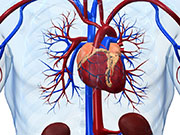One month after acute myocardial infarction, women were more likely to have a poorer recovery
TUESDAY, Feb. 10, 2015 (HealthDay News) — In younger people with acute myocardial infarction (AMI), stress may lead to a worse recovery and this may be of particular concern among women, a new study suggests. The report was published online Feb. 9 in Circulation.
Xiao Xu, Ph.D., an assistant professor of obstetrics, gynecology, and reproductive sciences at the Yale School of Medicine in New Haven, Conn., and colleagues collected data on 2,397 women and 1,175 men ages 18 to 55 with AMI. The study participants were from 103 hospitals in the United States, Spain, and Australia. To measure the patients’ level of stress, researchers used a 14-item scale that indicated how much people felt their lives were uncontrollable and overloaded during the past month. Women in the study were more likely to have other medical problems, including diabetes, chronic lung disease, kidney problems, depression, and cancer, as well as a history of heart problems and stroke. Women were also more likely to report stress over family issues. Men were more likely to be concerned about financial problems.
The researchers found that one month after AMI, women were more likely to have a poorer recovery. They also found that people with moderate or high stress levels more likely to have a worse recovery than women with low levels of mental stress. However, the effect of stress on recovery didn’t differ between men and women, according to the researchers. But because women experienced more stress overall, increased stress might partially explain their worse recovery.
“People need to be aware of the adverse impact on health of mental stress, and in this particular case, it may affect recovery after heart attack,” Xu told HealthDay. “Also, younger women experience greater stress than younger men. This may put women at higher risk for poor recovery.”
Copyright © 2015 HealthDay. All rights reserved.








